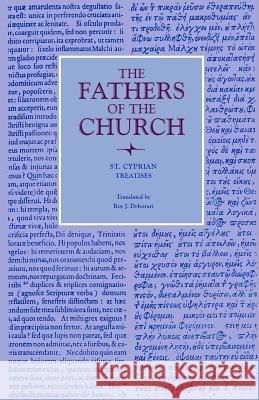Treatises » książka
Treatises
ISBN-13: 9780813215129 / Angielski / Miękka / 1956 / 372 str.
This volume presents several treatises of St. Cyprian (200/10?-258) in translation. To Donatus (Ad Donatum) is a monologue written shortly after Cyprian's baptism in 246 in which he extols his spiritual rebirth in the sacrament of baptism. Literary criticism has come to view this treatise as a model for St. Augustine's Confessions. The Dress of Virgins (De habitu virginum) written in 249 is addressed to women (""flowers in the Church's garden"") who have dedicated their lives to God's service. In this treatise on virginity Cyprian warns these women against seeking finery and the pitfalls of worldliness. The Fallen (De lapsis), written in 251, deals with the problems encountered in reconciling with the Church those who had defected during the time of persecution. These problems were acute especially after the Decian persecution. The Unity of the Catholic Church (De unitate ecclesiae), written very likely in 251, is directed in the first place against the Novatian schism. This treatise contains the famous words: ""He cannot have God for his father who does not have the Church for his mother."" The Lord's Prayer (De oratione dominica) is as the title indicates a commentary on theOur Father. Many of its words and phrases remind one of Tertullian whom Cyprian admired greatly. To Demetrian (As Demetrianum) is a vigorous defense of Christianity against pagan calumnies. Mortality (De mortalitate) written perhaps in 252 or later has often been described as being a pastoral letter of a bishop to comfort and console his flock during a time of trial and tribulation. Work and Alms (De opere et eleemosynis) is a treatise that may have been written in 252 or even later. It is a warm and heartfelt exhortation of a bishop to his flock encouraging them to do good works. The Blessing of Patience (De bono patientiae), written sometime during the year 256, has frequently been described as a sermon delivered during the controversy over the validity of heretical baptism in northern Africa. Jealousy and Envy (De zelo et livore) like the preceding treatise greatly resembles a sermon delivered on the topic in the title. It was probably written between 251 and 257.To Fortunatus (Ad Fortunatum), a work replete with quotations from Scripture to encourage a Christian in time of persecution, was probably written between 253 and 257. In its original Latin this treatise is an important witness to the text of the Bible before St. Jerome's revisions. That Idols are not Gods (Quod idola dii non sint) is a relatively unimportant work when judged on the basis of its content. Modern patristic scholars seriously doubt its authenticity











